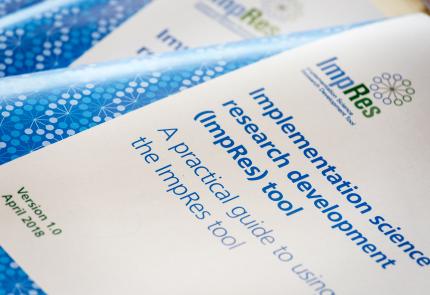An Introduction to Implementation Science: online module
This online module is a short course for health and social care practitioners, policymakers and researchers interested in learning more about implementation science.
This online module is a short course for health and social care practitioners, policymakers and researchers interested in learning more about implementation science.
The CPD-accredited module was created by a team of implementation science experts working at NIHR ARC South London and the University of East Anglia.
Implementation science is the study of methods to support the application of evidence and research findings in health and social care policy and practice. It seeks to understand the behaviours and practice of health and social care professionals, managers and policymakers, together with patients, service users and carers. The aim is to address the gap between the knowledge that can optimise health and social care services and what is actually delivered.
This module is relevant for anyone interested in improving health and social care services, including researchers, service user researchers, and health and social care practitioners, who want to develop their understanding of implementation science. It focuses on the theoretical and scientific methodologies of implementation and how to apply these in practice. It will be delivered at master’s of science (MSc) level (or level 7). If you are unsure about your eligibility and whether you will be able to take full advantage of the course, please email: arcshortcourses@kcl.ac.uk
Yes, this module will be delivered online over six weeks. The content includes recorded lectures from our faculty at King’s College London, University of East Anglia, Kingston University and St George’s, University of London. There will also be weekly discussion boards, group work using case studies and a supporting teaching fellow and live seminars. (Live seminars will be held during UK daytime; we will attempt to accommodate students living outside the UK, but depending on your time zone, you may have to watch a recording of the seminar.)
The course covers the core scientific principles and investigative methodologies of implementation science, including quantitative, qualitative and econometric approaches. It has a strong theoretical underpinning, drawing on theories, frameworks and models that can be used in the planning, development, implementation and evaluation of health and care interventions. Equally, it has a strong practical focus, providing you with ‘take-home’ tools, checklists and other resources that can help you to develop interventions in different health and care settings.
This introductory module in implementation science will provide you with the basic knowledge required to conduct implementation research or to apply the implementation theories and frameworks to their practice. The module could be taken as a standalone module.
Full course fee: £1,875
Discounts are available:
The lecturers were amazing so knowledgeable yet able to explain everything in normal language. Aoife was fantastic, so organised and kept everything clear as to what was happening when and also ensuring plenty of opportunities to discuss.
The structure of the module was good - I felt that the content flowed each week and the content of the following week built on the previous week nicely. The check-in sessions and additional workshops were also helpful. Also enjoyed the workshop on using the ImpRes tool
For more information, email: arcshortcourses@kcl.ac.uk
